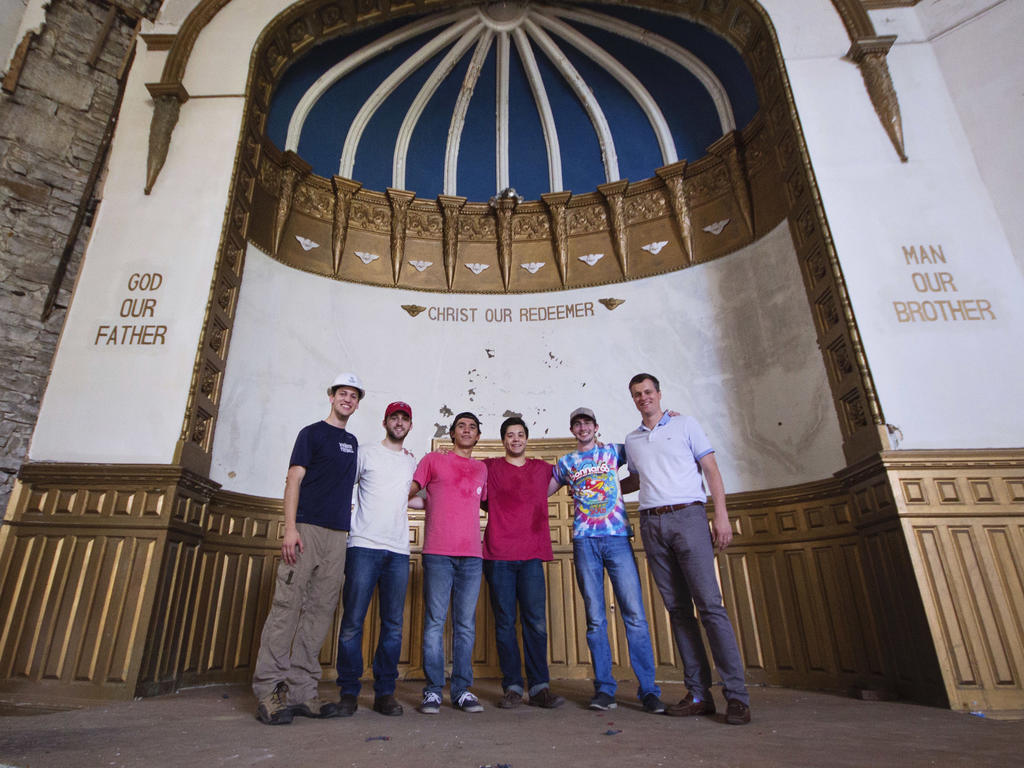Beginning in June 2016, senior Jay Hedges began working under Rob Thompson ’99 as a member of a momentous community effort to restore a historic church in downtown Memphis. Once a vibrant community space that acted as a home-base for the Memphis sanitation strike in 1968, the Clayborn Temple at 294 Hernando St. has since fallen into disrepair. In a broad restoration effort led by an organization formed in partnership with the nonprofit Neighborhood Preservation Inc., the building, which was originally erected in 1893 as Second Presbyterian Church, will again become a space for communal gathering and historical reflection and interpretation in downtown.
Hedges met Thompson, the executive director of the Clayborn Temple Restoration Project, through a mutual acquaintance at Downtown Church in Memphis. Shortly after their introduction, Thompson offered Hedges a position as an intern for the project that summer. As an intern, Hedges was responsible for leading and helping with a number of “pre-vitalization” projects designed to not only pave the way for greater construction in 2018, but to make the church a safe space for events and services right away. One of these events included members of Hedges’ fraternity and the Black Student Association going to the site and pulling nails out of the floor. Hedges says, “Last semester was pretty cool, getting the fraternity to come help on a Saturday morning like that. The building was getting some preliminary stabilization to hold events there; the ceiling is still exposed. It’s a bit of a mess, but it’s already open for concerts and church.” This semester, Hedges’ duties have been primarily focused on coordinating with and vetting grant-giving organizations that apply to be part of the project.
Working with the Clayborn project has been particularly impactful for Hedges, a present-day student activist for fair treatment and compassionate living. Having been named the Office of Multicultural Affairs Ally of the Year in 2015 and elected as both student trustee and the president of Rhodes Student Government, Hedges has made it a mission to help others throughout his time in college. As a collaborator on this project, Hedges says, “We’re trying to have a community-driven development project with anyone whose interests are in any way aligned with the mission and history of the church.”
What has been most inspiring for Hedges so far is an opportunity to see how Clayborn Temple has brought together multiple generations of the Rhodes community. “I have loved getting to know the history of the church, and it was really exciting for me to see the Sou’wester and other Rhodes students’ connections to it.” He explains that as a student trustee, he reached out to Rhodes board member, civil-rights activist, and agriculturalist Cary Fowler ’71. Fowler had attended demonstrations at Clayborn regularly as a Rhodes student, including the march led by Dr. Martin Luther King, Jr. during the sanitation worker’s strike that culminated with violence across the city on March 28, 1968. On this day, Clayborn was flooded with tear gas and members of the congregation were beaten and scattered throughout downtown in a showdown with police as looters and rioters vandalized the downtown area. The next day, 300 sanitation workers and ministers, carrying the iconic “I Am a Man” signs, marched peacefully from Clayborn Temple to City Hall. Hedges recalls, “I got to take Cary Fowler to Clayborn last semester and give him a tour with my boss. It was neat to be a part of these three generations of Rhodes students, who were all concerned, interested, and active in the history of the building.”
Today, the Clayborn Temple houses Downtown Church’s Sunday services, and Hedges remains an important part of the restoration project. He will continue to intern throughout this semester, intending to transition to a full-time position as the project’s grants coordinator after he graduates this May.
By Kenneth Piper '17
